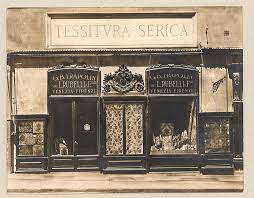Made in Italy par excellence.
The historical archives of Ca’ Pisani collect more than 6,000 textile documents dating from the late 15th to the first half of the 20th century. The collection began to be established in the second half of the 19th century.
The archive’s role as an indispensable support is also revealed in the preliminary research that precedes the reconstructions of ancient textile documents that belonged to historic residences, embassies, museums and cultural institutions in all parts of the world.
Lorenzo Rubelli was a former consul of the Habsburg Empire who had decided to cultivate the interest in fine textiles he had developed during his many travels. In 1889 he bought the textile company of Giovanni Battista Trapolin, which had belonged to Giacomo Panciera and his family since the eighteenth century and at the time had about seventy workers working on about fifty looms.
In the sestiere of St. Mark’s, overlooking the Grand Canal, stands the emblem of the transition from Gothic to Renaissance architecture in Venetian art: it is Palazzo Corner Spinelli, a splendid setting for the Historical Collection and the Rubelli Archives, more than 6,000 textile documents covering a time span from the late 15th century to the first half of the 20th century. Not only are records of the company’s origins jealously preserved here, but also important documents of textile art history from all continents that serve to inspire the company’s designers in the creation of new collections.
But what does Rubelli want to communicate?
The line, which “simply” bears the Rubelli name, offers textures and high-performance technical fibers designed for indoor and outdoor projects and linear, elegant residential and contract solutions.
Classic imagery that is transformed into a refined, glamorous and playful world interpreted in a collection of Jacquards and prints signed by Luke Edward Hall for Rubelli.
Designs, weaves, outdoor and wide-height fabrics where nature, directly or indirectly and more or less explicitly, is at the center.
Wall coverings “Walls of Venice” Textile items produced in Rubelli’s weaving mill and made of recycled polyester and natural fibers, and vinyl wall coverings, made in Italy and certified for contract and naval use; coverings suitable for both residential and contract use and well suited to both classic and contemporary environments: plain or false-units with sober tones, but also designs with a strong personality capable of transforming, renewing and animating “the horizon” of everyday living.

